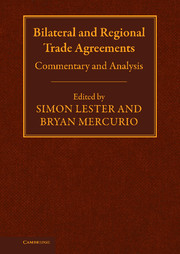Book contents
- Frontmatter
- Contents
- List of contributors
- Acknowledgements
- Foreword
- Table of cases
- Table of Treaties and International Agreements
- Table of abbreviations
- Part I Introduction
- Part II Economics and politics of PTAs
- Part III Relationship with WTO and international law
- Part IV Legal aspects of PTAs: A comparative analysis
- 7 Agriculture
- 8 Services
- 9 Investment
- 10 Government procurement
- 11 Intellectual property
- 12 Social issues: Labour, environment and human rights
- 13 Dispute settlement
- Index
- References
8 - Services
Published online by Cambridge University Press: 16 December 2009
- Frontmatter
- Contents
- List of contributors
- Acknowledgements
- Foreword
- Table of cases
- Table of Treaties and International Agreements
- Table of abbreviations
- Part I Introduction
- Part II Economics and politics of PTAs
- Part III Relationship with WTO and international law
- Part IV Legal aspects of PTAs: A comparative analysis
- 7 Agriculture
- 8 Services
- 9 Investment
- 10 Government procurement
- 11 Intellectual property
- 12 Social issues: Labour, environment and human rights
- 13 Dispute settlement
- Index
- References
Summary
Introduction
The services sector accounts today for two-thirds of global output (65% of GDP in 2004; 45% of GDP in 1960) and represents the fastest growing sector of the global economy. In a world where competitiveness is key to economic development, services play a vital role in ensuring a competitive economy. Service industries provide the infrastructure allowing modern economies to function by linking geographically dispersed economic activities or supplying crucial inputs into products competing in the domestic and global markets.
However, the share of services in global trade has been relatively low as certain characteristics of services, such as intangibility and non-storability, affect their tradability. Recent advances in information technology have nonetheless made trade in certain services now feasible or have greatly reduced its costs. Since 2000 trade in commercial services (including in particular transport, travel, communications, financial, professional services) has risen on average by 11 per cent per year with the share of global export from a few developing countries steadily increasing (China, India, Hong Kong and Singapore are among the top fifteen exporters of services). The growing internationalisation of services also presents certain challenges for developing countries in particular. For example, these include the need to undertake necessary investments in modern IT networks, adapt educational systems to the information age, and design appropriate domestic and regional regulatory structures for service sectors.
In recent years the number of international agreements purporting to liberalise and promote trade in services has increased dramatically.
- Type
- Chapter
- Information
- Bilateral and Regional Trade AgreementsCommentary and Analysis, pp. 184 - 214Publisher: Cambridge University PressPrint publication year: 2009
References
- 1
- Cited by

